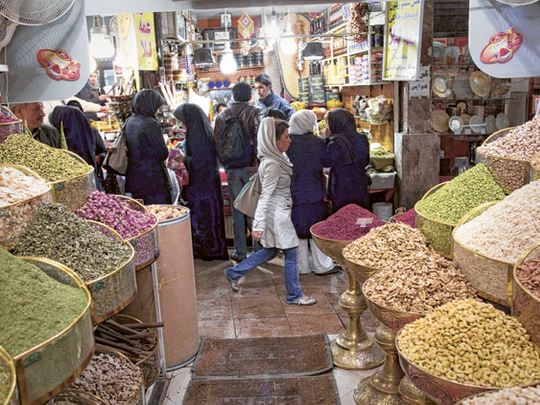
Dubai Iranian firm AHT exports millions of dollars worth of nuts and dried fruit each month but Western financial sanctions mean it gets little money in return. Instead it is paid with other goods, such as cardboard boxes and metal cans from China.
"Most of our business right now is like this. No money is involved in the process," Mohammad Ameen, managing director of the pistachio and raisin exporter, said at an international food industry show in Dubai last month.
"We import the goods, sell the goods to the local market, get the money from the local market, and then pay my staff and my farmers.
"No money is circulating — it's like thousands of years ago," Ameen said between negotiations with prospective buyers over bowls brimming with pistachios. Last year AHT's exports totalled about $100 million (Dh367 million), mostly to China and India.
Financial sanctions imposed over Iran's disputed nuclear programme have dealt a heavy blow to its foreign trade. Since late last year the United States has stepped up its use of anti-money laundering legislation to make it legally dangerous for banks that have any US business to maintain ties with Iran.
As a result, Iranian firms have been frozen out of much of the global banking system which finances trade. It is difficult or impossible for them to obtain letters of credit or conduct international transfers of funds through banks.
Finding a way
But the cases of AHT and other Iranian companies suggests many are finding their way around the obstacles and continuing to do business, albeit at considerable inconvenience and cost.
Some Iranian exporters and importers are resorting to barter; others are putting together complicated but legal networks of partners abroad to handle payments. Some are using transfers through money exchange houses instead of banks, or employing a legal but largely unregulated money transfer network known as hawala in the Middle East and hundi in India.
"Commerce takes preced-ence over everything, so if tomorrow there are sanctions or whatever else, there are always different ways of getting round it," said Sanjiv Sawla of Mumbai-based trading firm M Lakhamsi.
"There was a minor aberration for a while where there was a drop-off in trade, but everybody has put their systems in place now," he said. His firm trades about $125 million a year of seeds, spices, wheat and rice — some $5-$10 million with Iran.
Iran's exports in the last fiscal year to March 20 were estimated at $107 billion, of which $81 billion were oil and gas, according to the International Monetary Fund. Imports were estimated at $70 billion.
The Iranian government is scrambling to find ways to continue getting paid for its oil; Iran has agreed with India, for example, to settle 45 per cent of their oil trade in the rupee, which is not freely exchanged in global markets. The rupees may be used to pay for imports into Iran of Indian iron and steel, chemicals and cereals.
Most of Iran's non-oil businesses cannot count on such strong demand for their products, so for them it may be more difficult to work around the sanctions. But there are signs that many are managing.
Because of the freeze on bank transfers, the 20-odd Iranian food exporters among the 3,800 stands at last month's Dubai show paid cash or used the hawala network to secure modest stands in an outlying building at the sprawling exhibition centre.
Some Iranian exporters and suppliers to Iran said they still used banks in Turkey, which has kept some banking channels to Iran open to handle oil payments.
But AHT's Ameen said he had largely stopped using Turkish banks because of high fees or taxes, and because he feared the next wave of sanctions could freeze payments to him that were still in the pipeline. Barter is safer, he said.












